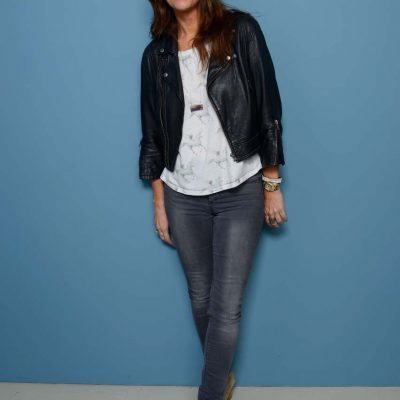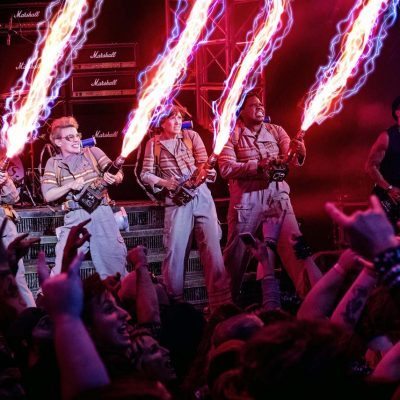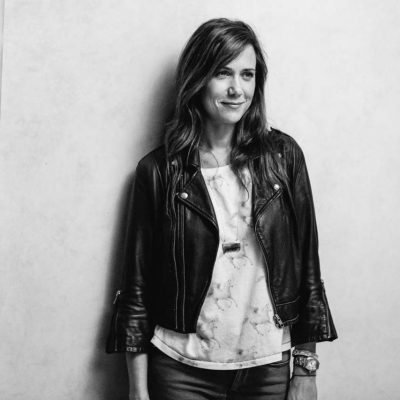The first major studio film faced with being social media’d into disaster, Ghostbusters and its star Kristen Wiig take it all in slapstick-stride
by Matt Scanlon, with reporting by susan hornik
The original Ghostbusters from 1984 was one of the biggest entertainment surprises of the 1980s. Produced by Columbia Pictures for the relatively thrifty sum of $30 million (given its all-star cast of Bill Murray, Dan Aykroyd, Sigourney Weaver, Harold Ramis, and Rick Moranis), the film went on to earn a starting $295 million, and establish Murray particularly as one of the powerhouse comedic stars of the era. In a celluloid age in which comedies were dominated by teenage sexual awakening romps—and when geeks were cinematic Kryptonite—the film was also a brave attempt at reinvigorating the sci-fi genre.
In the two decades-plus since Ghostbusters II was released in 1989 (with a $215 million box office total), there have been no less than a half a dozen attempts to conceive of a third film in the franchise, with plot lines including the trio of ghost hunters traveling to a dystopic, hellish version of New York City. That script concept, proposed by Aykroyd, was rejected by Columbia because of its $150 million budget, which was quite a studio mouthful for the mid-1990s. In the late aughts, Ramis and Aykroyd oversaw another script written by Gene Stupnitsky and Lee Eisenberg, but again, the pieces failed to come together. A sticking point in a number of pitches was whether Murray would agree to appear, with various cliffhanger moments teetering one way or the other, but in the absence of his commitment by 2013, not a sequel but a reboot was announced in 2014, with Bridesmaids director Paul Feig at the helm. Very shortly thereafter, the director, in a tweet, announced the casting of Kristen Wiig, Melissa McCarthy, Kate McKinnon, and Leslie Jones. Released on July 15, with Columbia Pictures once again in principle command, and wielding a budget of $154 million (estimated), the production included some gambles in its casting and plot contours.
In the film, Wiig and co-star McCarthy play very modestly successful authors Erin Gilbert and Abby Yates, who have written a book indicating that ghosts are real. After scoring a teaching gig at Columbia University, Gilbert finds herself embarrassed by her ghost book past, only to discover that ghoulish specters have, once again, invaded Manhattan. She and McCarthy reunite, and team with McKinnon (who plays nuclear engineer Jillian Holtzmann) and subway worker Patty Tolan, played by Jones. Together, they attempt to save the world from Rowan, a demon played by Neil Casey. Costars include Andy Garcia (as New York City’s mayor) and Elizabeth Perkins as a fellow scientist. Almost as publicized as the principal cast list is its roster of cameos, which includes Murray, Aykroyd, Weaver, Ernie Hudson, and Ozzy Osbourne, who plays himself. Though there were a number of shooting locations here in the city, Boston constituted the lion share of the urban sets.
All the pieces seem to be in line: a cast that emphasizes the empowerment of women, enthusiastic participation by the studio, and a relatively brisk box office market for comedies.
Then the wheels began to fall off.
First was the trailer, which was viewed a stupendous 24 million times in its first 24 hours on YouTube, and more than 60 million times across all social media platforms within its first seven days. The trouble was that it also generated an outpouring of accusations of racial bias in the casting of white Ghostbusters as scientists or intellectuals, but Jones as an MTA employee. Polemics were issued by Janessa E. Robinson in The Guardian, Akilah Hughes in Fusion, and Nico Lang in Salon, with Hughes famously describing Jones’s character as a “minstrel show.” Robinson, for her part, lambasted the production for ignoring “Latino, Asian, and indigenous women.”
Fans of the original Ghostbusters also took to social media in waves, complaining about using women as principal characters rather than men. So outspoken and vitriolic were the tweets and posts that Feig was quoted in a March 2016 issue of Variety as describing them as “some of the most vile, misogynistic shit I’ve ever seen in my life… I figured [they’d be] whacked-out teenagers, but almost constantly it [was] someone who’s bio said, ‘Proud father of two!’ and who has some high-end job. You’re raising children and yet you’re bashing me about putting women in my movie?”
Commenting on the YouTube trailer’s viewer ratings of 12,000 “thumbs-up” and 13,800 “thumbsdown” on the morning of its release, AdWeek described the reaction as “one of the most polarizing in recent memory.” As of July, the clip is officially the most disliked movie trailer ever on YouTube, with 250,000 likes and 875,000 dislikes at time of press, spiced by the addition of dozens of lampooned or otherwise spoofed cuts. It wasn’t long before industry pundits were wondering whether this could be the first major studio film that had been essentially down-voted into box office disaster.
Other than the director, the cast has remained mostly silent about the controversies, with Wiig merely commenting in an interview with the Los Angeles Times that she was “bummed” about the gender fracas. “The fact there was so much controversy because we were women was surprising to me,” she offered. “Some people said some really not nice things about the fact that there were women. It didn’t make me mad, it just really bummed me out. We’re really honoring those movies.”
The Saturday Night Live cast member from 2005 to 2012, whose film credits include Knocked Up (2007), Bridesmaids (2011), Girl Most Likely (2013), the Despicable Me series, and The Martian (2015)—seems to be taking all these unexpected developments in her stride, and instead offered details of why audiences should give these new characters a chance. About her character, Wiig explained that, “Erin grew up believing in ghosts—she actually saw a ghost when she was a child, and no one believed her except Abby. That really scarred her. She wanted to live a life where she wasn’t the weird one, so she left the paranormal world behind and went into academia, becoming a professor at Columbia. Of course, she finds Abby again and meets Holtzmann and Patty. As it turns out, they’re these four misfits that find each other. I love that kind of story.”
“It was important to me to cast actors who were friends in real life,” explained Paul Feig, “because when you do that, you get a level of camaraderie, realness, and warmth between them that you don’t sometimes get when you put actors together who don’t know each other. It’s always been important to me—and one of the reasons why I think Bridesmaids worked so well. Kristen and Melissa were Groundlings together, did Bridesmaids and Saturday Night Live together. Kate and Leslie are on SNL right now. All four of them have worked together in various projects, and they all have a very different sense of humor that complements each other. Kristen is just so good at that contained, neurotic comedy that she keeps very fun; Kate is a physical comedian, but has this inner oddness, providing the movie with a weirdo energy; Leslie is just an explosion that comes onto the set; and Melissa is the leader of the pack. You’re really getting four very distinct characters, four very distinct personalities, who also happen to be able to kick a lot of ghost ass.”
Wiig was similarly thrilled by the chemistry between the four Ghostbusters.
“It’s always a great experience when you can find that right project with your friends and people that you love,” she said. “I’ve known Melissa for many years—we knew each other for almost 10 years before Bridesmaids. She’s just really fun to work with and we laugh all the time, so it was so nice to be together again. Leslie makes me laugh so hard with everything she does; every time Leslie said something, I would just lose it. [Hers] is a very funny character, but I don’t even have words for what she does with every line. She’s so specific and it comes directly from her. And Kate…Kate’s the best. I find her so interesting. She’s so fearless… takes chances every scene. She does the unexpected, and it’s always funny. I love watching her.”








